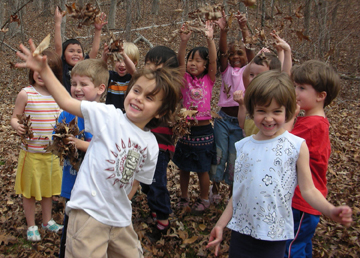Ask any parent and they’ll confirm the winter holiday season is filled with pressure. But, oftentimes, parents have no idea that stress affects their children, too. Imagine for a moment the changes in routine that the holidays can bring:
- A boost of gifts received.
- An influx of family and friends.
- A break from the daily routine of school and childcare.
- An increase in babysitters.
- A disruption of bedtime.
- An increase in unfamiliar settings (involving parties and travel).
- The introduction of a figure who appears once a year, dresses strangely, possesses the power to decide whether children receive gifts, invades homes at night and encourages young children to sit on his lap to share their wish list.
No wonder the winter holiday season can be stressful for young children. The reason consistency is an integral part of young children’s lives is because they require stability and predictability to remain emotionally grounded (the younger the child, the more relevant). After all, children depend on their external environment as an anchor to build their internal foundation of stability.
Luckily, the holidays can still be an exciting and magical time for children as long as parents maintain a level of consistency in their lives. Following are his parental recommendations for providing a holiday season the whole family can enjoy.
- Pay attention to personal well-being because parents’ emotional stability and availability are the top contributing factors to a child’s sense of a solid foundation. Parental calm will diminish children’s stress while parental distress will add to it.
- Eat well, exercise, get adequate sleep, limit extra activities and find ways to bring shopping under control. Think about reasons that the holidays cause personal stress, depression or anxiety and address those issues immediately.
- Be present as much as possible, perhaps foregoing parties and events to be with children.
- Help children focus on values, whether secular or faith-based, including the value of giving to others. Holidays should not be primarily about accumulating and receiving. Children who receive, but are not asked to contribute and give, are more likely to feel entitled, greedy and even guilty that they get so much and give so little. Children will feel more grounded and secure when parents find concrete ways to help them give to others during this season.
- Encourage children to actively participate in traditions like baking, decorating, delivering gifts and contributing to charitable decisions. One reason childhood holiday traditions are treasured is because they offer warmth and predictability.
- Avoid changes that are controllable.
- Avoid unfamiliar babysitters.
- Maintain consistent bedtime routines. If the family is traveling, take along children’s favorite bedtime comfort items like books and other treasured items.
- Remember that while older children (7 years old and older) can usually tolerate the suspense of not knowing whether they’ll receive a gift, it is too much for most 4-year-olds. There is no law against parents spilling the beans, allowing a child to grow into a capacity to better tolerate the suspense.
Because holiday situations and traditions vary according to family, parents will have unique opportunities and challenges associated with the holidays. However, prioritizing children’s needs first and sticking with as many of these tips as possible will ensure a more positive holiday experience for everyone in the family.
About the Author:
Dr. Donald L. Rosenblitt is the founding and current clinical and executive director for the Lucy Daniels Center for Early Childhood, where he is a child psychiatrist and psychoanalyst. The Center is the Triangle’s largest nonprofit provider of children’s mental health services and includes on-site and in-home therapeutic services and preschool and kindergarten programs for children. As the 2009 charity recipient of Band Together, a nonprofit that raises money to support and build awareness for Triangle charities, the center received more than $140,000 in donated funds, making it possible to hire three additional therapists and serve an additional 150-175 families in the upcoming year.
For more information on the Center, please visit www.lucydanielscenter.org. For more information on Band Together, please visit www.bandtogethernc.org.





